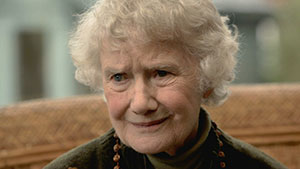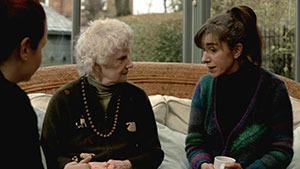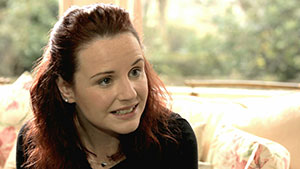


Watch the film clip of Ellen, Caroline and Shirley and consider the questions at the bottom of the page.
 Ellen is 80 and lives at home. Her husband died six years ago. She has three children and four grandchildren. Her sons both live at a distance and her daughter Caroline lives nearby and visits three times daily. Ellen has four grandchildren. Ellen had a busy life before she was diagnosed with dementia and enjoyed cooking, dressmaking and seeing her women friends.
Ellen is 80 and lives at home. Her husband died six years ago. She has three children and four grandchildren. Her sons both live at a distance and her daughter Caroline lives nearby and visits three times daily. Ellen has four grandchildren. Ellen had a busy life before she was diagnosed with dementia and enjoyed cooking, dressmaking and seeing her women friends.  Caroline is Ellen's daughter. She lives close to her mother with her husband and two children and has a part time job in a town centre shop. Caroline is very concerned about her mother and what the future will bring. She visits three times a day to cook and clean for her mother and support her with personal care. She is anxious in case her mother leaves the house and becomes lost and has therefore dissuaded her from visiting old friends.
Caroline is Ellen's daughter. She lives close to her mother with her husband and two children and has a part time job in a town centre shop. Caroline is very concerned about her mother and what the future will bring. She visits three times a day to cook and clean for her mother and support her with personal care. She is anxious in case her mother leaves the house and becomes lost and has therefore dissuaded her from visiting old friends. Shirley graduated as a social worker two years ago and is working with adults in the community. Shirley is interested and committed to working with people with dementia, their families and carers and recognises that she needs to develop her knowledge and skills in this area of practice.
Shirley graduated as a social worker two years ago and is working with adults in the community. Shirley is interested and committed to working with people with dementia, their families and carers and recognises that she needs to develop her knowledge and skills in this area of practice. You have printed a page containing audio/video content. We can't print that, so we've provided a transcript for you instead.
Shirley - Jennifer Stokes at the day centre has asked me to come and see you Mrs Banks. She speaks very fondly of you. It seems like you have known each other for some time.
Ellen- Yes. I think so.
Caroline - She has been a huge help to us.
Shirley - Oh that's good. She has asked me to visit because she is concerned about you. Well, she is concerned about you both in fact. Let me explain what my team does. We work with older people to give them some support to live in the way that they choose to at home. There are many ways that we can help, and if we can't we can point you in the direction of someone who can help.
Caroline - Mum, you are not fine. You haven't cooked a meal in months. You used to keep a perfect house, and you were always immaculate. Look around you.
Shirley - Mrs Banks, I'm sure that there are many things that you can do perfectly well. But there might be some things like cooking, looking after yourself and getting out and about that have become a bit more difficult. Jennifer at the centre has noticed the changes. She has also noticed that you don't seem to be as happy attending the centre as you used to be.
Ellen - No! It's... it's just the... Oh, you know. Oh I don't know.
Shirley - It can be difficult to find the words sometimes Mrs Banks, can't it? Don't worry. We can take our time and we can talk about the changes at the centre. And, if you would like to, we can also talk about ways that we can support you to do the things that are important to you.
Caroline - Well I think that's a good idea mum. What do you think?
Ellen - [looks to Caroline] Yes... maybe.
Shirley - It's good that we have got your daughter here to ask for advice. She's the one that spends most time with you and knows you best, isn't she?
Ellen - [looks to Caroline and nods] Yes.
Shirley - Mrs Banks, what I would really like is if you and I could get to know each other a bit better. Would that be ok?
You can download the question paper to write and save your answers. You'll need Adobe Acrobat installed on your computer to use the question paper.